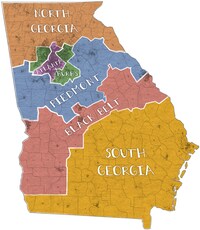A man holds a United States flag in Santa Fe, New Mexico, on Dec. 9.
Robert Alexander/Getty Images
If you’re wondering what the electoral path forward is in 2020, just look at what the Republicans are doing. Over the past decade, the GOP has moved in lockstep to take over state legislatures and other local offices, pressing its agenda at every level. The party has had the backing of well-financed groups that in turn expect their limited-government, free market legislation to be prioritized. It’s not a popular mandate, but Republicans keep getting reelected anyway, thanks to their outside support and organization. And heading into this pivotal election, Democrats don’t seem to have the same kind of unity and electoral infrastructure.
To learn more about how Republicans have held onto power, I spoke with Alexander Hertel-Fernandez, a political scientist who teaches at Columbia University, on Monday’s episode of What Next. We talked about the political ecosystem conservatives built from the ground up, and whether Democrats can assemble anything like it. Our conversation has been edited and condensed for clarity.
Mary Harris: If you picture a map of the U.S., with the states colored red or blue depending on which party controls the legislatures, there are more red states. That’s because Republicans have prioritized gaining control of statehouses and using that power aggressively. When Democrats have gained majorities in state legislatures, they haven’t wielded that power as purposefully as Republicans have.
Alexander Hertel-Fernandez: A great example is what’s happening right now in Virginia, which flipped to having full Democratic control for the first time in about two decades. The state government had an opportunity to pass laws that would greatly expand union rights, making it easier for private sector workers to unionize and for those unions to have more resources. Those efforts got scuttled—in fact, the governor said it would be a mistake for Democrats to prioritize these laws. The fact that Democrats have this internal division over what they should do first is just such a striking comparison with what happens on the right.
A key question when your side gains control of state government is: What are you going to do with that power? What are the things you’re going to do first, and what are you going to do later? Those are questions conservatives are really good at answering. When Republicans take over state governments, they first try to weaken unions and other progressive activist groups, and then change election rules in ways that will make it easier for them to win again.
State Republicans have gotten good at this mainly because they have a major organizing force on their side: the American Legislative Exchange Council, commonly called ALEC. It was founded with money from wealthy conservative donors and corporations. Members, including state lawmakers and huge companies, get access to a whole library of potential legislation prepared by ALEC. Some of these bills include laws like “stand your ground,” voter ID requirements, anti-union measures, and legislation to block Medicaid expansion. It all comes from this one group.
Many state legislatures don’t give lawmakers the proper resources to make policy. ALEC provides all of those resources: the ideas behind the bills, the polling that they would need to pass, a hotline that lawmakers can call if they want help drafting a piece of legislation or coming up with a good argument. ALEC essentially serves as a private research assistant for state legislators.
ALEC and organizations like it are pushing policies that most voters don’t want, which means that the only way they can pursue that agenda is by making it harder for people to participate in elections and doubling down on appeals to the sort of white identity politics that we’re seeing in the Republican Party today.
Back when ALEC started, in the ’70s, it was actually Democrats who controlled most state governments. They leaned on the organizational power of teachers unions to achieve their goals.
At this time, when teachers unions were forming, they were becoming very politically active. They weren’t just lobbying on education-related policies. They were supporting liberal Democrats and pushing for higher taxes and more regulation on private sector businesses. Conservatives saw this, and in particular they saw that the unions were connected across the states, so they could share ideas and resources across borders. Republicans realized that if they were going to be competitive, they had to come up with similar cross-state networks of their own.
“Many state legislatures don’t give lawmakers the proper resources to make policy. ALEC provides all of those resources.” — Alexander Hertel-Fernandez
So ALEC modeled its organization off these unions?
It both modeled its organization off unions and was founded out of the threat that unions presented to them at time. The rise of public sector labor unions in the ’60s and ’70s was an important reason why conservatives felt like they had to get their act together and create organizations at the state level.
When union power declined, Democratic power also declined. It seems to me that ALEC takes advantage of the fact that while Democrats did benefit from powerful unions, those unions were also holding Democrats accountable. Nowadays, Democrats aren’t fully incentivized to make unions more powerful because they are also accountable to corporate interests.
That’s exactly right. The situation has only got worse as Democrats have come to increasingly rely on support from white-collar professionals, financial executives, and Silicon Valley CEOs. These are people who tend to be much more skeptical of labor unions. And that makes it harder for Democrats to think about supporting labor policy that would bolster unions.
What can progressives learn from what ALEC’s doing? Or have progressives forgotten what the unions were already doing back in the ’70s?
I think progressives have now realized that the states matter, particularly after what happened in the 2010 election and the shifts in state politics that we’ve seen since then. The question is whether the organizations they’re investing in can have the same effect as the organizations on the right.
Is there a progressive analogue to ALEC?
There have been a number of progressive efforts over time to construct counterweights to ALEC, but they’ve often fizzled out because they haven’t received sufficient attention from donors or were too focused on organizing power in states that were already progressive, like New York or California. The State Innovation Exchange supports local legislators in a number of key states. Future Now is trying to replicate ALEC’s success by building a national network and thinking about the ways policy can be used to either advantage one’s allies or defang one’s opponents.
I wonder if you ever get frustrated with how much attention Trump gets, because it seems that Trump is separate from what these state-level organizations are doing. And I wonder if you look at some of the national coverage that focuses on what’s happening at the presidential level, when the real electoral problem is somewhere else every day.
Every day. It didn’t matter, in a way, whether Trump or another Republican candidate ended up winning, because these organizations would have worked with the Republican administration in any case to pursue the sort of policies that complement the party at the local, state, and national level.
Listen to the full episode using the player below, or subscribe to What Next on Apple Podcasts, Overcast, Spotify, Stitcher, or wherever you get your podcasts.
Slate is covering the election issues that matter to you. Support our work with a Slate Plus membership. You’ll also get a suite of great benefits.


